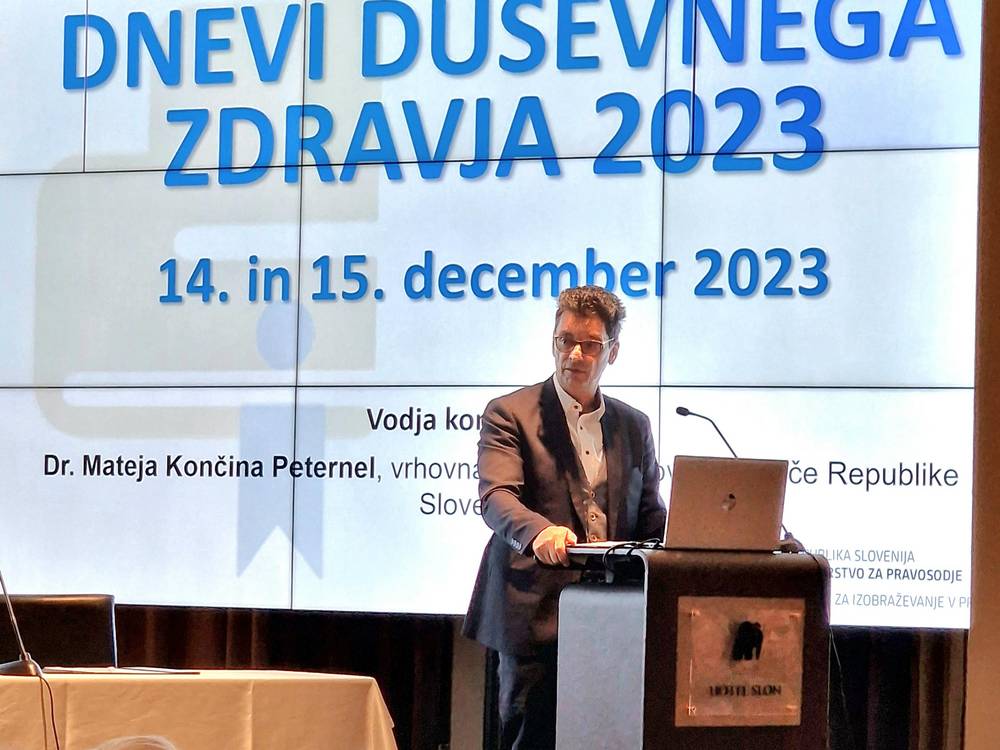On 14 December 2023, Human Rights Ombudsman Peter Svetina in his introductory speech at Hotel Slon in Ljubljana, at this year’s Mental Health Days where they dealt with procedures before courts according to the Mental Health Act, recalled that the Ombudsman has been dealing with the issue of placing people in secure wards of social welfare institutions according to the decisions of courts. “The majority of complaints the institution of the Ombudsman receives in the field of mental health are due to unsolved systemic questions, which are also connected to the implementation of the Mental Health Act (ZDZdr),” he stated. The Ombudsman finds issues related to the lack of staff, problems with the normative arrangements, overcrowding, and long waiting periods for admission to the institutional care, where needed, yet simultaneously also premature institutionalisation.
“Involuntary hospitalisation in a psychiatric hospital or placement and detention on a secure ward of a social care institution means an intervention into human rights and fundamental freedoms of a detained person, therefore the Ombudsman supports the shortening of such detentions. At the same time, we encourage other forms of treatment of people with mental health problems, which must be carried out in a community or in their home environment. Hence, I call for activities in the direction of deinstitutionalisation to be strengthened, which is also in accordance with the European guidelines in the field of social or institutional care. This enables people with mental health disorders to live a dignified life and the right to independent life,” emphasised Ombudsman Svetina.
Later, the Ombudsman’s findings on this subject were introduced by the Deputy Ombudsman Ivan Šelih and Jure Markič, MSc, Consultant to the Ombudsman. Ombudsman Svetina brought attention to the important role of courts in ensuring respect for human rights and fundamental freedoms of people treated in psychiatric hospitals, in departments under special supervision or on the secure wards of social care institutions and are part of supervised treatments. “Courts have a crucial role in ensuring the mental and physical integrity of these persons and the respect of their dignity. In addition to deciding on admittance for treatment, they also decide on limiting their rights, while their main guideline in this must be the respect of human dignity, as was also ruled on by the Constitutional Court of the Republic of Slovenia in the decision from 2017 in relation to the constitutional appeal filed by the Ombudsman,” said Svetina. If intervention into a person’s freedom is being decided on, the constitutional court especially highlights that one of the most important rights that must be guaranteed to a detained person is the right to judicial protection regarding the legality of the detention. “If the judicial control over the legality of the detention is ineffective, the key legal safeguard fails which guarantees to persons awaiting a decision about admittance to treatment that there will be no arbitrary interventions into their right to personal liberty from Paragraph 1 of Article 19 of the Constitution,” added Ombudsman Svetina.
He deemed the Mental Health Days an excellent opportunity for forming mutual connections, exchanging experience and best practices, discussing open questions, and removing obstacles in the work process. Svetina expressed his satisfaction with the fact that the conference was once again attended by a great number of various stakeholders who can contribute to the raising of standards in mental health and to raising awareness of society on the issue of mental health. He thanked all co-organisers, and especially the Judicial Training Centre, for their efforts and contribution they have been making for years to the fact that important topics are being discussed at the Mental Health Days and that the issue is being approached in a multidisciplinary way. He also encouraged everyone present to listen to the useful proposals for how the situation can be improved in this field and realise them.

